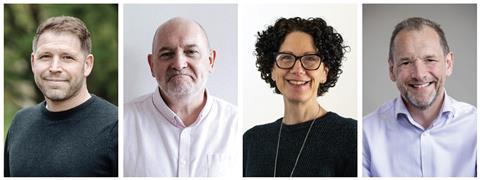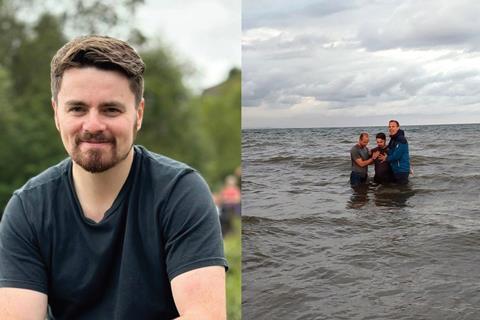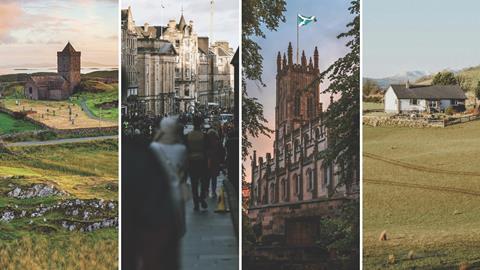Is holy rain beginning to fall in Scotland? This is no dreich day in the Highlands, reports Sharmila Meadows, rather, it’s the sound of renewal. Churches are seeing congregations grow as more and more people turn to Christ
If Christians were looking for a blueprint for church ministry, Jesus offers one in the Gospels. He takes time to prepare his disciples to share the good news, teaching them the word and how to pray, commanding them to love one another and serve humbly. Then, before he leaves, he instructs them to wait for the infilling of the Holy Spirit.
His model would characterise and empower the early Church – and today in Scotland, a group of church leaders are unashamedly pursuing that model with a thirst for a fresh movement of God.
Scotland played host to one of the last great British revivals when two elderly sisters in an island cottage cried out to God in prayer. What took place from 1949-53 is now known the world over as ‘The Hebridean Revival’. Could it be about to happen again?
Peter Anderson, senior pastor of City on a Hill, Edinburgh says he is convinced that “evangelical unity paves the way to revival”. He’s part of a recent prayer movement, established in 2018, which began with a group of Edinburgh-based pastors gathering to pray for a fresh outpouring of God’s Spirit. Today, as many as 150 leaders from various denominations across Scotland are involved. At least 30 gather every week to pray “with an ache for the lost”, says Anderson, united around what he refers to as the “highest bar: the authority of scripture; the divinity of Jesus Christ and the gospel”.
Signs of growth
Jim Gibson of Freedom City Church in Cumbernauld says that this “phenomenal” prayer movement has been gathering pace since Covid. “It’s the beginning of revival,” he says. “A trickle, but not yet a river.” Lynne Paterson, head of the Evangelical Alliance in Scotland, agrees: “There are definitely green shoots of revival. It’s like there’s a wineskin, but the wine has not yet [been] poured out.”
As rumours of a quiet revival across the UK gain momentum (see p38), James Glass, regional leader of Elim in Scotland, says that good news stories are no longer unusual. Instead, he is hearing about increasing attendance, conversions and baptisms “constantly”. And Glass isn’t just referring to urban churches in cities like Glasgow or Edinburgh, but also small, rural communities.
Those involved in the prayer movement say they are witnessing substantial growth
In the year to Easter 2024, a small Baptist church on the Isle of Arran doubled in number, forcing a relocation to larger premises. Meanwhile, Skye Bible Church reported that 16 youngsters were added to the fledgling student union at Portree High School. In Pitlochry, a quarter of the local high school now attends church. And in the village of Kirkliston, 100 children and young people now attend the church’s various clubs and activities.
Churches in Hamilton, Glasgow and Galashiels have all reported growth. Life Church Edinburgh say they have doubled in size. Several churches have outgrown their space and either added services, reconfigured their building or acquired extra locations to meet demand.
Unfortunately, there is no existing research to provide a baseline comparison, but anecdotally, those involved in the prayer movement say they are witnessing a substantial growth in demand for adult baptisms. King’s Church, Aberdeen baptised 21 adults in a three-week period, Bearsden Baptist Church, Glasgow held eleven youth baptisms in one month and Glasgow City Church baptised 14 people on Easter Sunday (including a new convert during Holy Week).
The leaders involved attribute this shift to a pronounced focus on national prayer and church unity, complemented by a revival strategy that has evolved beyond serving communities and church planting to the passionate pursuit of an awakening.

A time and a place
Scotland’s strong history of revival and mission includes notable figures such as Robert Moffat, David Livingstone and Eric Liddell, but the era since the Hebridean revival has been tough. Secularisation and deprivation have grown as church attendance appears to have shrunk. But Glass believes this social fracturing has opened new doors for the gospel. “There’s a sense that we’ve lost our way. Scotland suffered in the 1980s with the closure of mines and shipbuilding. I also wonder if the failure of the independence movement affected the Scottish psyche.”
Scotland also has the highest rate of addiction-related deaths in western Europe. “There’s an epidemic of addiction in Scotland, dating back to the second world war, so it’s three to four generations deep now,” Gibson explains. These factors have created “a desperation to see change”, says Gibson. “And when people do find Jesus, there’s a desperation to see it through.”
People are being drawn towards Jesus by a Church that has long been practically demonstrating his love
Against this backdrop of need, many Scottish churches have been faithfully serving their local community – through foodbanks, soup kitchens, warm spaces or drug and alcohol rehabilitation – for years. And now, several church leaders feel they are reaping the rewards. People are being drawn towards Jesus by a Church that has long been practically demonstrating his love.
Gibson has seen this in the support Freedom City Church offers to those struggling with addiction, which he calls “love without judgement”. As a safe space to which people can return even when they fail, they are also clear about what brings long-term, lasting change. “We’re a church, not a rehab centre so, ultimately, we want people to know Jesus. That brings them freedom,” he says.
Peace in the storm
Martin was recently baptised at Portobello Beach, Edinburgh, but his faith journey began in 2022. During his second year at Edinburgh Napier University, a Christian friend invited him to her small group at City on a Hill.

“What really stood out to me was how welcoming and loving everyone was. I now realise it was God’s presence I was experiencing. I continued going to church and small group each week and was given my first Bible, which I eventually began to read. What really stood out to me was the love through the words.
“I never thought I was good enough for anything. These ways of thinking developed within me over a long period of time. I remember messaging the woman who invited me to church saying: ‘I feel I need to get to a place where I love myself first and then I can love God’. I will never forget her reply, which was something along the lines of: ‘Well actually, you need to love God first so that he can work in your life and you can get to a place where you can love yourself.’” That Sunday, Martin made a faith commitment. Deciding to follow Jesus was “the best decision of my life”, he says.
“I have been through a lot of pain and struggles, which resulted in me losing trust in people,” Martin continues. “It got to a point where something needed to happen, otherwise I would no longer be on this earth.” That Sunday, after giving his life to Christ, Martin left church and retreated to the Pentland Hills to read his Bible. His devotional plan led him to Lamentations 3:25-33. “I felt something rushing through me – and a kind of shock that these verses were really speaking to me. I remember repeating: ‘I am a follower of Jesus now.’”
Since that moment, he says God has been building his confidence and bringing him peace and hope. “I am not saying all pain goes away, but there is hope in Jesus – and knowing him gives us peace in any storm, a firm foundation in life and a love that is beyond understanding.”
Together in love
In the Gospel of John, Jesus commanded his disciples to “love one another: just as I have loved you…By this all people will know that you are my disciples” (13:34-35, ESV). It is a command that those engaged in the Scottish prayer movement have taken seriously, intentionally placing their differences aside and eschewing competition in order to unite across denominations and pray for their nation. They believe that this has been instrumental to their progress.
“There’s a real hunger and appetite for corporate prayer and worship,’ says Paterson, “which is hugely critical. Scotland is now leading the way in cross-tribe unity.” She feels this can offer a useful model for others to follow. Anderson agrees: “Rumours of what’s happening in Scotland are spreading across the UK, so there’s a definite recognition of a need for…unity and persistent prayer.”
Back at Freedom City Church, Gibson reports that God continues to move powerfully. “People are walking in and asking to be saved,” he says. “People in addiction know their need and recognise their sin, and that opens the way to repentance and salvation.”
Rumours of what’s happening in Scotland are spreading across the UK
A key scripture of Scotland’s 1949 Hebridean revival was Isaiah 44:3: “For I will pour water upon him that is thirsty, and floods upon the dry ground: I will pour my spirit upon thy seed, and my blessing upon thine offspring” (KJV). In a post-war Britain that has seen a widespread falling away of faith for many, could the hunger and thirst from the Scottish Church be once more breaking up dry ground?
From the Highlands to the isles to the cities, it does seem a Scottish downpour is beginning. These church leaders are now waiting, in expectation, for the flood.







































No comments yet